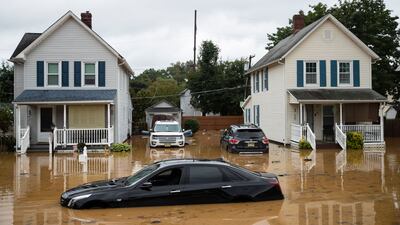Sounding the alarm on the "serious and systemic risks" climate change poses to the US economy and financial system, the White House on Friday unveiled a government-wide offensive to reduce vulnerabilities.
US officials say the strategy will start to adjust to the changing environment and mitigate financial damage from extreme weather that increasingly has caused damage to homes and businesses as well as disrupting supplies.
The US has this year been hammered by extreme weather events exacerbated by climate change.
In February, a storm in Texas led to widespread power outages, 210 deaths and severe property damage. Wildfires have raged across the West, and a "heat dome" in the Pacific Northwest caused record temperatures in Seattle and Portland, Oregon.
Hurricane Ida struck Louisiana in August and caused deadly flooding in the Northeast.
"If this year has shown us anything it is that climate change poses an ongoing urgent and systemic risk to our economy and to the lives and livelihoods of everyday Americans," said Gina McCarthy, President Joe Biden's climate adviser.
The actions being recommended by the Biden administration in a 40-page report reflect a significant shift in the broader discussion about climate change, suggesting that the nation must prepare for the costs that families, investors and governments will bear.
The White House report said extreme weather has cost Americans an additional $600 billion in physical and economic damages over the past five years alone.
The report is also an effort to showcase to the world how serious the US government is about tackling climate change ahead of the United Nations Climate Change Conference running from October 31 to November 12 in Glasgow, Scotland.
The policies range from mortgage standards to government procurement policies to rules governing pension funds, insurance and information for investors.
The initiative follows on Mr Biden's executive order in May, instructing the nation's federal agencies to look at ways to mitigate risks throughout the economy and financial system, some of which have been rolled out in recent days.
Among the steps outlined is the government’s Financial Stability Oversight Council, tasked with developing the tools to identify and mitigate climate-related risks to the economy.
The Treasury Department plans to address the risks to the insurance sector and availability of coverage. The Securities and Exchange Commission is looking at mandatory disclosure rules about the opportunities and risks generated by climate change.
The Labour Department on Wednesday proposed a rule for investment managers to factor environmental decisions into the choices made for pensions and retirement savings.
The Office of Management and Budget announced the government will begin the process of asking federal agencies to consider greenhouse gas emissions from the companies providing supplies.
Mr Biden’s budget proposal for fiscal 2023 will feature an assessment of climate risks.
- Agencies contributed to this report







